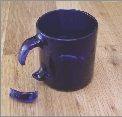Use Participles
1 TRY OUT LANGUAGE
2 LEARN GRAMMAR
3 APPLY ON YOUR OWN
You can make your sentences more interesting by adding participles. A participle is a verb form that can be used as an adjective.
| EXAMPLES | The bird landed in the water. People had polluted verb the water. The bird landed in the polluted adjective water. |
| The bird picked up a cup. The cup was floating verb. The bird picked up a floating adjective cup. |
• The present participles of regular and irregular verbs end in -ing.
• The past participles of regular verbs end in -ed.
• The past participles of irregular verbs usually have a new spelling.
| Regular Verb | Irregular Verb | Present Participle | Past Participle |
|---|---|---|---|
| break | breaking | broken | |
| damage | damaging | damaged | |
| discard | discarding | discarded | |
| leak | leaking | leaked | |
| litter | littering | littered | |
| tear | tearing | torn |
Practice Together
Combine each pair of sentences. Move the underlined participle to tell about a noun in the other sentence. Say the new sentence.
1. A group is cleaning the beach. The beach is littered with trash.
2. Some volunteers pick up glass. People had broken the glass.
3. Others collect food. People had discarded it.
4. One person found a sandal. Someone had torn it.
Try It!
Write the underlined participle. Combine the sentences and hold up the participle as you say it in the new sentence.
5. We repair items so we can use them again. The items were damaged.
6. I fixed an umbrella. Someone had broken it.
7. My mom mended a shirt. I had torn it.
8. My sister repaired a hose. The hose was leaking.

Someone will fix this broken cup.